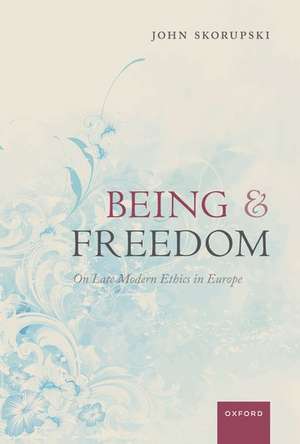Being and Freedom
Autor John Skorupskien Limba Engleză Paperback – feb 2024
| Toate formatele și edițiile | Preț | Express |
|---|---|---|
| Paperback (1) | 224.77 lei 10-16 zile | +64.34 lei 6-10 zile |
| OUP OXFORD – feb 2024 | 224.77 lei 10-16 zile | +64.34 lei 6-10 zile |
| Hardback (1) | 784.81 lei 31-37 zile | |
| OUP OXFORD – 8 apr 2021 | 784.81 lei 31-37 zile |
Preț: 224.77 lei
Preț vechi: 250.74 lei
-10% Nou
Puncte Express: 337
Preț estimativ în valută:
43.03€ • 44.25$ • 35.70£
43.03€ • 44.25$ • 35.70£
Carte disponibilă
Livrare economică 18-24 ianuarie
Livrare express 14-18 ianuarie pentru 74.33 lei
Preluare comenzi: 021 569.72.76
Specificații
ISBN-13: 9780198913696
ISBN-10: 0198913699
Pagini: 560
Dimensiuni: 170 x 245 x 30 mm
Greutate: 1 kg
Editura: OUP OXFORD
Colecția OUP Oxford
Locul publicării:Oxford, United Kingdom
ISBN-10: 0198913699
Pagini: 560
Dimensiuni: 170 x 245 x 30 mm
Greutate: 1 kg
Editura: OUP OXFORD
Colecția OUP Oxford
Locul publicării:Oxford, United Kingdom
Recenzii
Being and Freedom is as much a consideration of European moral thought in the age of the rise of mass democracy and the age of a crisis in Christianity as it is an examination of what 'late modern' philosophers have to say about normativity and reasons. It is a remarkable achievement.
An impressive and important contribution to our understanding of late modern ethics and will be an essential resource for anyone with serious interests in the history of ethics.
This is more than a work of intellectual history; Skorupski's discussion is critical, and he applies some of the lessons from this period to contemporary issues in ethics and metaethics. The range and depth of this book make it an indispensable resource for study of ethics, political theory, or the history of ideas
Ce livre est indispensable, à la fois par sa clarté et sa lucidité, par la profondeur de son enquête historique, par l'originalité des vues d'un des philosophes britanniques les plus importantes dans les discussions contemporaines sur les norms et les raisons, et par son sens, si rare chez les philosophes analytiques, de la synthèse et de l'histoire.
This book is indispensable for its clarity and lucidity, for the depth of its historical investigation, for the originality of the views of one of the most important British philosophers in contemporary discussion of norms and reasons, and for its sense of synthesis and history, so rare among analytic philosophers.
An impressive and important contribution to our understanding of late modern ethics and will be an essential resource for anyone with serious interests in the history of ethics.
This is more than a work of intellectual history; Skorupski's discussion is critical, and he applies some of the lessons from this period to contemporary issues in ethics and metaethics. The range and depth of this book make it an indispensable resource for study of ethics, political theory, or the history of ideas
Ce livre est indispensable, à la fois par sa clarté et sa lucidité, par la profondeur de son enquête historique, par l'originalité des vues d'un des philosophes britanniques les plus importantes dans les discussions contemporaines sur les norms et les raisons, et par son sens, si rare chez les philosophes analytiques, de la synthèse et de l'histoire.
This book is indispensable for its clarity and lucidity, for the depth of its historical investigation, for the originality of the views of one of the most important British philosophers in contemporary discussion of norms and reasons, and for its sense of synthesis and history, so rare among analytic philosophers.
Notă biografică
John Skorupski is a British philosopher with strong interests in history and social science. He was born in Italy of Polish parents, coming to Britain when just a few months old. He graduated in philosophy and economics from the University of Cambridge and has held philosophy posts in Glasgow, Sheffield, and St Andrews Universities. His books include Symbol and Theory (Cambridge, 1976), John Stuart Mill (Routledge, 1989), Ethical Explorations (OUP, 2000), and The Domain of Reasons (OUP, 2010). He is married to Barbara and has two daughters, Katharine and Julia. He and his wife live in London.
